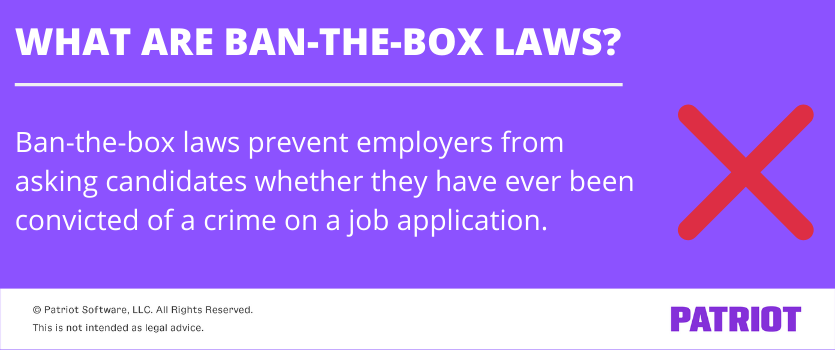No business owner wants to deal with penalties, fines, and lawsuits due to the hiring process. To protect your business from sticky legal situations, you need to know state laws, like ban-the-box. What are the states with ban-the-box laws?
About ban-the-box laws
Ban-the-box laws prevent employers from asking candidates whether they have ever been convicted of a crime on a job application. Some ban-the-box laws prohibit employers from learning about possible criminal convictions until after the interview or even a conditional job offer. There is currently no federal ban-the-box law. Ban-the-box is regulated at the state level.

Employers hiring in states with ban-the-box laws cannot ask questions like:
- “Have you ever been convicted of a crime? Check yes or no.”
- “Were you on probation in the last five years?”
- “Have you ever been arrested?”
Ban-the-box states established the law to help individuals with criminal records have a better chance of getting jobs.
David Reischer, criminal law expert and CEO at LegalAdvice.com, provided the following insight into the importance of ban-the-box laws for applicants with criminal records:
Ban-the-box laws help employers keep an open mind when hiring someone that has a criminal record. The state laws help employees to obtain conditional employment by delaying an employer from running a background check until after a small interim of time has passed, typically after the first interview.”
Not to mention, some studies have found a link between relapse into criminal behavior (known as recidivism) and the inability to find employment. A Manhattan Institute study reported that 35.6% of nonviolent offenders who received intensive job training were rearrested. On the other hand, 52.1% of nonviolent offenders with standard job training were rearrested.
Although there is no federal ban-the-box law, there is a proposed bill known as the Fair Chance Act. The Fair Chance Act would prevent federal agencies or federal contractors from asking about criminal history on job applications.
What are the states with ban-the-box laws?
There are a number of states and cities with ban-the-box laws, and that number continues to grow.
Some states have laws that only apply to government employers while others have laws that apply to all employers.
States’ ban-the-box laws only apply to employers with a certain number of employees. And, the laws regulate when employers can conduct background checks.
Here are the ban-the-box states (2019) with laws that affect private employers:
- California
- Colorado
- Connecticut
- D.C.
- Hawaii
- Illinois
- Massachusetts
- Minnesota
- New Jersey
- New Mexico
- Oregon
- Rhode Island
- Vermont
- Washington
California
California’s ban-the-box law is known as the Fair Chance Act. This law impacts employers with five or more employees.
However, there are some exemptions, including:
- Certain positions in health care facilities
- Farm labor contractors
- State criminal justice agencies
- Employers required by another law to conduct background checks
- Employers required by law to restrict employment due to criminal history
Are you an employer in California with five or more employees and do not meet the exemption qualifications? If so, you cannot ask applicants about conviction history before making a conditional job offer.
After making a conditional job offer, you can then conduct a criminal history check. However, the following cannot play a role in your hiring decision:
- Arrests without convictions
- Participation in pretrial or post-trial diversion programs
- Convictions that are sealed, dismissed, expunged, or statutorily eradicated
California law requires employers to make an individual assessment when looking into an applicant’s conviction history.
Employers who decide to revoke a job offer based on a criminal history check must notify the applicant in writing, provide a copy of the report, and give the candidate five business days to respond.
You can view more information about California’s Fair Chance Act on their state website.
Colorado
Colorado’s recent ban-the-box law, known as the “Colorado Chance to Compete Act,” took effect in September 2019.
Currently, the law affects employers with 11 or more employees. But by September 2021, the law will affect all employers. The law does not impact government agencies.
Under Colorado’s ban-the-box law, impacted employers cannot prohibit people with criminal records from applying for the position. And, employers cannot ask about criminal history on the initial job application.
Not all employers have to follow Colorado’s ban-the-box law. Employers required by law to conduct criminal checks or restrict employment due to criminal history are exempt. And, employers participating in a program to encourage the employment of individuals with criminal histories are also exempt.
For more information on the Colorado Chance to Compete Act, head over to Colorado’s state website.
Connecticut
An Act Concerning Fair Chance Employment is Connecticut’s ban-the-box law. All employers, regardless of number of employees, are subject to the law unless they are exempt.
Employers must comply with Connecticut’s An Act Concerning Fair Chance Employment unless:
- Another law requires them to conduct criminal history checks
- The position requires a security or fidelity bond
Under the act, employers cannot ask candidates about criminal charges, convictions, or prior arrests on the initial employment application. And, employers cannot deny employment due to an erased or pardoned criminal record.
You can learn more about An Act Concerning Fair Chance Employment on Connecticut’s state website.
D.C.
Washington D.C.’s ban-the-box law is known as the Fair Criminal Record Screening Act. It applies to all employers with 11 or more employees. The law does not apply to government agencies.
There are some exemptions from the law, including:
- Employers who are required to consider an applicant’s criminal history
- Positions designated to encourage the employment of individuals with criminal histories
- Positions or services that work with minors or vulnerable adults
So, what does the law do?
D.C.’s ban-the-box law prevents certain employers from asking questions about a candidate’s criminal record until they make a conditional offer of employment. After making a conditional offer of employment, employers can only ask applicants about criminal convictions.
For more information on D.C.’s Fair Criminal Record Screening Act, check out their website.
Hawaii
Hawaii was the first state to implement a ban-the-box law.
Private employers of all sizes are subject to Hawaii’s ban-the-box law. Employers cannot ask candidates about criminal history before making a conditional employment offer.
Illinois
Illinois’ ban-the-box law is known as the Job Opportunities for Qualified Applicants Act. Private employers with 15 or more employees are subject to the law.
Employers exempt from the law are those who are:
- Required to exclude applicants with certain criminal convictions
- Filling positions that require a standard fidelity bond or equivalent
- Employing individuals licensed under the Emergency Medical Services (EMS) Systems Act
The Job Opportunities for Qualified Applicants Act prevents employers from asking applicants about criminal history until they have been scheduled for an interview. If there is not an interview, employers cannot ask about criminal history until after a conditional offer of employment.
To learn more about the law, check out Illinois’ government website.
Massachusetts
Massachusetts’ ban-the-box law is included under the state’s Criminal Offender Record Information Act (CORI).
Employers in Massachusetts cannot ask applicants about their criminal record information on the initial job application. And, employers cannot ask job applicants about misdemeanors that took place over three years before the date of the application. The law applies to all employers, regardless of the number of employees.
Massachusetts employers can ask about criminal convictions if another law requires employers to disqualify candidates with criminal convictions.
Eager for more information on Massachusetts’ ban-the-box law? You can head over to their state website to learn more.
Minnesota
Minnesota’s ban-the-box law applies to all employers. It requires employers to wait to ask about criminal records until after selecting an applicant for an interview. If there is no interview, employers must wait until after extending a conditional job offer.
If another law prohibits you from hiring an individual with a criminal conviction record, you are exempt from Minnesota’s law. Employers required to conduct a criminal history background check or consider an individual’s criminal history are also exempt from the law.
Learn more about Minnesota’s law by visiting their state government website.
New Jersey
New Jersey’s Opportunity to Compete Act prevents employers with 15 or more employees from asking applicants about their criminal records until after the first interview. Employers also cannot ask candidates orally about their criminal histories during the initial application process.
There are a number of employers exempt from New Jersey’s Opportunity to Compete Act, including positions in:
- Law enforcement
- Corrections
- The judiciary
- Homeland security
- Emergency management
If the law requires you to conduct a criminal background check or if you are in a position that encourages the employment of people with criminal records, you are also exempt.
You can learn more about New Jersey’s ban-the-box law on their state website.
New Mexico
New Mexico’s ban-the-box law is called the Criminal Offender Employment Act. Employers, regardless of size, cannot ask applicants about criminal history on the initial employment application.
Employers are allowed to consider an applicant’s criminal conviction after reviewing their application and discussing employment with the candidate.
For more information about New Mexico’s Criminal Offender Employment Act, check out the state’s website.
Oregon
Oregon’s ban-the-box law applies to all private employers, regardless of size.
Under the law, employers cannot ask candidates about their criminal history on a job application or prior to the first interview. If there is no interview, employers cannot ask until after they make a conditional job offer.
There are some exemptions to Oregon’s ban-the-box law. Employers required to consider criminal history are exempt. And, businesses that are law enforcement agencies or in the criminal justice system are exempt. Employers looking for volunteers are also exempt.
Check out Oregon’s state website for more information.
Rhode Island
Rhode Island employers with four or more employees cannot ask candidates about their criminal history on the initial job application.
Employers are exempt if they are:
- Required by law to disqualify candidates based on criminal history
- Required to obtain a fidelity bond and the candidate’s conviction would prevent them from getting it
Want to learn more? Head on over to Rhode Island’s state website.
Vermont
Vermont’s ban-the-box law applies to all private employers, regardless of size. The law prevents employers from asking about criminal history on the initial employee application.
Are you a Vermont employer? If so, you need to know about exemptions from the law. You do not need to follow the ban-the-box law if the position you’re hiring for requires you to disqualify candidates based on conviction under the law.
You can learn more about Vermont’s ban-the-box law on their state website.
Washington
Washington’s Fair Chance Act states that all employers cannot ask questions about criminal history on the job application. And, employers cannot prevent people with criminal records from applying.
Who’s exempt? Employers are exempt if they are:
- Hiring people with unsupervised access to children or vulnerable adults or persons are exempt
- Working in law enforcement or criminal justice agencies, financial institutions, or national or registered securities entities
- Required by law to find out about an applicant’s criminal history
- Hiring volunteers
For more information on the Fair Chance Act, visit Washington’s website.
Ban-the-box by state: Chart
Use the chart below to find out which states have ban-the-box laws and employers impacted. And, get a quick summary of what the law does.
| States With Ban-the-box Laws | Private Employers Affected | What Does it Do? |
|---|---|---|
| California | Employers with 5 or more employees | Employers cannot ask about criminal records before making a conditional job offer |
| Colorado | Employers with 11 or more employees | Employers cannot ask about criminal history on the initial job application or prevent those with criminal histories from applying |
| Connecticut | All employers | Employers cannot ask about an applicant’s criminal history on the initial job application |
| D.C. | Employers with 11 or more employees | Employers can only ask about criminal convictions after making a conditional job offer |
| Hawaii | All employers | Employers can only ask about criminal convictions after making a conditional job offer |
| Illinois | Employers with 15 or more employees | Employers can only ask about criminal records after the applicant has been selected for an interview or a conditional job offer is made (if there is no interview) |
| Massachusetts | All employers | Employers cannot ask applicants about criminal record information on the initial job application or about misdemeanors that took place over 3 years before the application date |
| Minnesota | All employers | Employers cannot ask applicants questions about criminal records until they have been selected for an interview or a conditional job offer is made (if there is no interview) |
| New Jersey | Employers with 15 or more employees | Employers cannot ask candidates about their criminal record until after the first interview of a job applicant |
| New Mexico | All employers | Employers cannot ask candidates questions about criminal history on the initial job application |
| Oregon | All employers | Employers cannot ask candidates questions about criminal history until after the first interview or a conditional job offer is made (if there is no interview) |
| Rhode Island | Employers with 4 or more employees | Employers cannot ask candidates questions about criminal history on the initial job application |
| Vermont | All employers | Employers cannot ask candidates questions about criminal history on the initial job application |
| Washington | All employers | Employers cannot ask about criminal history on the initial job application or prevent those with criminal histories from applying |
What to do if your business is in one of the ban-the-box states
If your business has a ban-the-box law, here’s a quick snapshot of what you should and shouldn’t do:
- Find out whether you are affected
- Do not include a tick box on job applications asking about criminal records
- Understand your state’s specific ban-the-box rules to learn when you can conduct criminal background checks
Ready to hire a new employee? Don’t forget to add them to payroll! Thousands of small businesses use Patriot’s online payroll to run payroll (and save time and money). We use a three-step process, offer free setup and U.S.-based support, and more. Start your free trial now!
This is not intended as legal advice; for more information, please click here.



